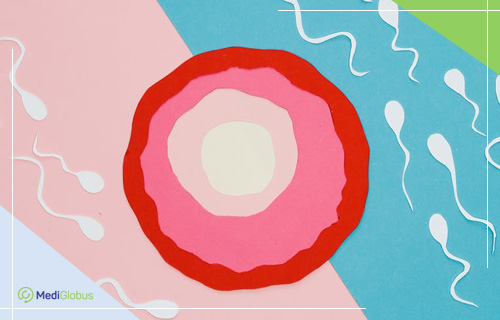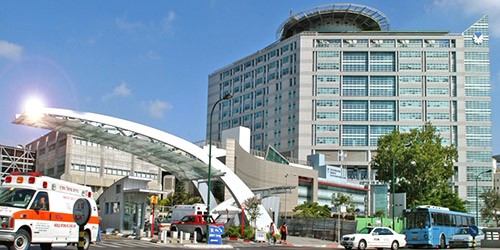According to the World Health Organisation, about 5% of the world’s population has trouble conceiving. This means that around 49 million couples in the world suffer from infertility. The statistics are shocking, but it is not as bad as it seems at first sight. Thanks to advances in modern reproductive science, many families manage to have children, despite the difficulties. However, before the baby is born, they face the medical inability to conceive or bear a healthy child. Solving this issue should be the priority. The experts of the international medical platform MediGlobus have prepared the 10 most frequently asked questions about infertility and provided answers to them.
Listen to the article:
Question 1: Where do I start for infertility screening?
Infertility refers to the inability of a sexually mature woman or man to conceive and bear a child. One in eight couples cannot have children for one medical reason or another. In 70% of cases, the problem can be solved with the help of advanced reproductive technology.
Couples do not always realise right away that they have fertility problems. It sometimes takes months to notice this. An infertility test is recommended for those who have not been able to conceive for a year. If the man or woman is over the age of 35, it is worth having a fertility diagnostis after six months of trying unsuccessfully to get pregnant.
Testing for infertility usually begins with a consultation with a gynaecologist. He asks about your medical history (if you have one), performs a physical examination and prescribes the necessary tests.

Sometimes it takes weeks or even months to find out the exact reasons for fertility problems. So don’t get upset if you can’t get an answer quickly.
To book a consultation with a leading specialist in gynaecology and reproduction abroad, fill in the feedback form on our website. We will help you arrange an in-person or remote consultation with a competent doctor.
Question 2: Which tests show infertility in men and women?
There can be a huge number of reasons for infertility. Therefore, there is no single test that shows for sure that a woman or a man has a fertility problem. An ultrasound is initially used to detect anatomical issues. This examination allows doctors to look at and assess the condition of the woman’s ovaries, uterus and fallopian tubes.
Patients are also advised to have blood tests to check their hormones. One of these is a test for FSH or follicle-stimulating hormone (glycoprotein) levels. It is responsible for the ability of the ovaries to produce and release an egg every month.
The norm for this hormone is 3.5-12.5 mU/mL in the menstrual and follicular phases, and 4.7-21.5 mU/mL in the ovulatory phase. A high FSH level indicates reduced fertility. Normally, the values are checked at the beginning of the menstrual cycle (day 3 of menstruation).

Sometimes women need to monitor ovulation patterns by checking cervical mucus, taking their temperature or using home ovulation tests.
Other diagnostic procedures are carried out if the above-mentioned tests do not find the cause of female infertility. A hysterosalpingography (HSG) test is used for this purpose. It allows you to determine whether or not your Fallopian tubes are open. During the examination, the doctor puts a contrast agent into the uterus and then uses an X-ray machine to see how it moves through the fallopian tubes.
Some women need surgical testing for infertility. Minimally invasive surgery is performed with special instruments. This allows the fallopian tubes, ovaries and uterus to be checked for functional problems in more detail.
For men, fertility testing usually involves a physical examination, a spermogram and blood tests to detect hormonal abnormalities. The patient’s semen is tested for several indicators:
how many active spermatozoa are in the semen sample,
sperm velocity,
sperm size and shape,
the amount of seminal fluid.
Question 3: What causes infertility in women?
About 70% of female infertility cases are caused by problems with ovulation – the release of an egg from the ovary into the fallopian tube. This process normally occurs every month and lasts 12-48 hours. Without ovulation, there are no eggs to fertilise. This is why the patient cannot get pregnant. The main signs that a woman has ovulatory dysfunction include irregular and sparse periods. Problems with ovulation are often associated with polycystic ovary syndrome (PCOS). This is an abnormality of the ovaries that usually occurs against the background of excessive male hormones (androgens).
Other important causes that can cause infertility in women:
presence of endocrine disorders (e.g. diabetes mellitus);
age over 35 years;
endometriosis;
adverse effects of toxins (lead, pesticides, herbicides, etc.);
structural problems with the fallopian tubes, uterus or ovaries;
excessive physical activity that exhausts the body;
obesity or being underweight;
smoking and alcohol abuse.
Question 4: What are the main causes of male infertility?
About 35% of all cases of infertility are related to male health. Infertility in the male sex happens most often due to the poor quality and quantity of sperm. This is influenced by factors such as:
varicocele (varicose veins in the testicular canal);
impaired ejaculation;
age over 40 years old;
venereal diseases (trichomoniasis, syphilis, chlamydia, etc.);
congenital testicular abnormalities;
chronic diseases of the testes, urethra or prostate;
infectious diseases (mumps, influenza, etc.);
trauma or congenital abnormalities of the genitourinary system;
abnormalities in blood hormone levels;
unhealthy habits (smoking, alcohol).
Question 5: What should I do if I have infertility of unclear genesis?

Infertility of unclear genesis is an unpleasant diagnosis heard by one in 5 couples who seek help from a reproductologist or gynaecologist. This means that the exact cause of fertility problems cannot be determined even after a long and detailed examination. Often this situation is due to latent pathologies that are not related to the male or female reproductive system.
In-vitro fertilisation (IVF) can be used to combat this condition. This is the most effective treatment for unspecified fertility problems. It is usually supplemented by assisted reproductive technology, ICSI, which involves artificially injecting the best sperm into the cytoplasm of the egg.
If you are diagnosed with infertility of unclear genesis, there is no need for despair. Some couples manage to conceive and give birth to a healthy child without any medical help within 1-2 years of diagnosis.
Question 6: Can there be infertility after medical abortion?
Medical abortion is an artificial termination of pregnancy with medication. It is carried out at an early stage of pregnancy (up to 8 weeks). The procedure does not involve surgical intervention in the uterus, so there is a lesser risk of complications. Many women can have children after that. In only 5% of cases, patients who underwent an abortion have a fertility disorder.
Question 7: How can infertility be treated?
| Infertility treatment options for women | Infertility treatment options for men |
|---|---|
| Medical stimulation of ovaries. It involves taking hormonal medicines that promote the normal production of healthy eggs in each menstrual cycle. | Lifestyle adjustments, avoidance of bad habits, reduction of certain medications and normalisation of physical activity can help some males increase their fertility. |
| Surgical restoration of fertility. This involves operations to remove various genital abnormalities (e.g. endometrial polyps, intrauterine scars, uterine myoma, endometriosis). Such diseases can be treated using organ-preserving hysteroscopic or laparoscopic surgery. | Medication therapy can improve the number and quality of sperm, which significantly increases the likelihood of a successful pregnancy. These medicines can optimise testicular function, including the production of sufficient sperm volume. |
| Intrauterine insemination (IUI) is one of the most commonly used fertility treatments. It involves placing spermatozoa directly into the woman’s uterus using special instruments. The procedure is carried out around the time when the patient is ovulating and the ovary releases one or more eggs for fertilisation. | Surgery to correct functional abnormalities of the genitourinary system. For example, varicocele causes an increase in temperature in the testicles, which harms the quantity and quality of sperm. This problem can be solved surgically. After the operation, the man’s overall chances of conceiving a child naturally considerably increase. |
| Assisted reproductive technology. This is the treatment of fertility disorders, which consists of the effect on the egg and sperm. There are many such fertility treatments but in-vitro fertilisation (IVF) is considered the most common. This technology consists of several stages: stimulation and retrieval of mature eggs, fertilisation with sperm in a laboratory and subsequent transfer of embryos into the uterus. IVF is often supplemented with other assisted methods, such as Intracytoplasmic Sperm Injection (ICSI). | Sperm extraction is a microsurgical technique to obtain the maximum volume of active sperm for further artificial fertilisation of the egg. It is indicated when ejaculation is difficult or when there are few spermatozoa in the sperm sample. |
Question 8: What is the effectiveness of fertility treatment?
The success rate of infertility treatment varies widely depending on the age of the man and woman and the medical diagnosis. When treating any kind of fertility disorder, the doctor will individually tell the couple their estimated chances of conceiving and getting pregnant. For example, the rate of IVF treatment for women under the age of 35 is around 46% and around 30% for women aged 35-40.
Question 9: When is infertility untreatable?
In 5-7% of cases, infertility cannot be cured. Even after drug therapy and assisted reproductive technology, some women are unable to become pregnant or bear a child. Predominantly the true cause of such a problem is not identified. Therefore such couples may be offered surrogacy services or the use of donor sperm (in the case of male fertility problems).
Question 10: Where can I get fertility treatment abroad?
The leading destinations for infertility treatment for men and women abroad are Turkey, Spain, Israel and Korea. Internationally recognised specialists in the field work there. They have many years of experience in the successful treatment of fertility disorders. One of these specialists is Professor Selman Laçin. He is the leading obstetrician-gynaecologist of the Turkish Medicana Clinic in Istanbul. He carries out more than 800 in-vitro fertilisation procedures a year. He has more than 25 years of experience.
The top medical centres for infertility treatment abroad are:
Resume
Infertility is a health disturbance that results in the inability to conceive a child. This condition can be helped. In 65% of cases, there are problems related to the health of the female body. Women cannot have children because of difficulties with ovulation and men because of the poor quality and quantity of sperm.
The diagnosis of infertility involves a series of tests, including those intended to measure male and female hormone levels. Also ultrasound, hysterosalpingography, etc. for the female sex. For men, a spermogram is mandatory.
Treatment of infertility can be medical or surgical. Sometimes the disease can be treated by adjusting the lifestyle, normalising the hormone levels or removing the dysfunction with invasive surgery. Some patients have IVF, which is an assisted reproductive technology that involves the birth of eggs outside the patient’s body.
Patients often go to Turkish, Spanish, Israeli or Korean clinics to combat infertility. Notable among them are: Medikana, Koç, Teknon, Ichilov, Assuta, SoonChonHyang and the IVF Centre in Madrid.
To arrange your infertility trip abroad, click on the button below and open the contacts to find a contact. We suggest you with the choice of a suitable clinic and doctor.













